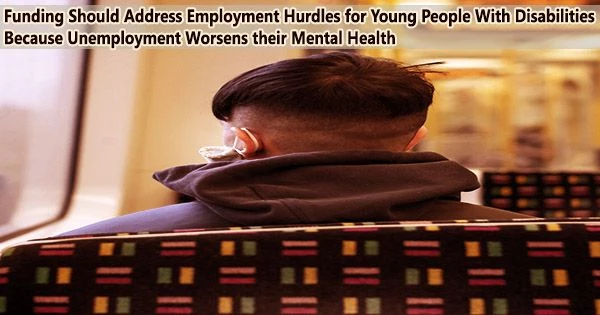Governments in Australia invest a lot of money in helping young people with disabilities find employment. But these initiatives have only had minimal success.
Despite significant investment in employment services and initiatives, the employment rates for young people with disabilities have remained low over the past 20 years. While 80% of those Australian adults without disability are in jobs, only 48% of those with disability were in work in the most recent Survey of Disability, Ageing and Carers.
As a result, young adults with disabilities are substantially less likely to be employed than counterparts without disabilities. Our most recent study indicated that young individuals with disabilities who are employed have improved mental health.
Unfortunately, present initiatives to increase employment participation are mainly geared on potential disabled workers rather than the surroundings that may support and employ them.
Young people with disability have poorer mental health to start with
Young people with disabilities have significantly worse mental health than their counterparts without disabilities, and this difference appears to be growing.
We are aware that employment improves mental health and that unemployment deteriorates mental health. Our earlier research shown that young people with disabilities experience a greater negative impact from unemployment than do young people without disabilities.
This may be due to factors like loss of work identity and financial stress which can affect all unemployed people. Due to their greater economic and social disadvantage and the larger obstacles they have in finding employment, people with disabilities may, nevertheless, experience these and other repercussions that are harsher.
Our study used Household, Income and Labour Dynamics in Australia survey data from 2016 to 2019 and included 3,435 young adults aged 20 to 35. The 377 young adults with disability in our sample had poorer mental health than young adults who didn’t report a disability. They were also less likely to be employed.
We checked to see how much of the poorer mental health experienced by young adults with disability could be improved if they had the same employment rate as their peers without disability. To do this, we used a method called “causal mediation analysis” which allowed us to estimate how much having a disability affects the mental health of young adults.
We then took this estimate and split it into two parts: the effect on mental health due to unemployment, and the effect on mental health not due to unemployment.
We found nearly 20% of the poorer mental health reported by young adults with disability could be alleviated by helping those who want to work into jobs.
Employment programs may not be hitting the mark
The National Disability Insurance Scheme (NDIS) promised to improve employment rates for young participants. The School Leaver Employment Supports program is the main way NDIS participants are supported to move out of school and into work. Only 29% of program participants found mainstream work, according to data from the most current report, and more than half were unemployed when they finished the program.
Other programs, like Disability Employment Services and Workforce Australia, provide support to people with disability to find and keep a job. Outside of school leaver supports, the NDIS can provide funding to help participants find and keep a job.
According to our research, helping more young people with disabilities find jobs could help reduce the difference between their mental health and that of those without disabilities. But the focus shouldn’t be just on the job seeker.
Room for improvement
NDIS Minister Bill Shorten has targeted the school leaver supports program for reform as part of concerns around the financial sustainability of the NDIS, including changing the way the School Leaver Employment Supports program is funded. This would entail rewarding service providers for helping young people with disabilities find good career opportunities as opposed to just provide assistance.
The current focus of services is on strengthening the jobseeker’s capability and capacity for employment through vocational training. This can include education and training. But this is often outside a workplace setting rather than “on the job” training, which may be more effective.
Additionally, concentrating just on the job seeker misses the additional challenges faced by people with disabilities, such as discrimination and structural disadvantage. People with disabilities who are seeking for work often come across ableist wording in job adverts and application software that may weed out applicants with gaps in their employment history. People with physical or sensory disabilities may find it challenging to engage in job interviews in inaccessible buildings.
People with disabilities may encounter hostile coworkers, employers that are unable to make appropriate accommodations, and a lack of flexible work schedules while at work. Talking to their employer may be particularly challenging for certain people with invisible disabilities, such as psychological disabilities, due to their fear of prejudice and stigma.
To address the prejudice that persons with disabilities encounter in the job market and at work, meaningful government action is required.
The employment results of young people with disabilities are further impacted by additional employment hurdles, such as safe and stable housing or accessible means of transportation to and from work.
More training for staff and connections between government services could guarantee that job seekers with disabilities receive assistance with these aspects of their daily lives. In order to hire, accommodate, and advance the careers of individuals with disabilities, employers also require clear direction and support.
Young adults want to work
We know young adults with disability want to work and to have the same opportunities as everyone else.
Supporting the mental health of young people with disabilities requires assisting them in finding suitable employment that matches their skills, requirements, and objectives. However, young adults with disabilities will continue to have lower employment rates and poorer mental health, which puts them at risk for a reduced quality of life, until we address these larger concerns that prevent them from finding job. Failing to address this issue also adds to welfare and health system expenses.
We owe it to young people with disability and their mental health to make job opportunities a reality.
















